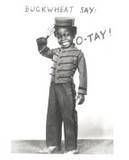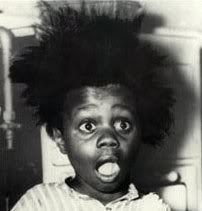


Posted on 07/04/2012 1:39:02 PM PDT by NoLibZone
Still carrying a grudge against a country that has made Chris Rock wealthy and famous way beyond where his waning talents should've taken him, this was how the once-interesting and once-edgy comedian celebrated the 4th of July on Twitter today:
(Excerpt) Read more at breitbart.com ...
ENOUGH WITH THE IGNORAMUS RASIST COMMENTS
If everyone can please share any source from which this rasist lout derives income, this white person will withhold her green money fromm supporting it.
Thanks
“hardcore marxist socialism “
AKA Black liberation theology with jeremiah wright.
We’re doing okay today, thanks, and I hope you and your family are, too. My 12-year-old and her friends made a purple cake, with an attempt at an American flag in icing ... it all tasted like vanilla, though, so it’s gone.
Thank you. There are quite a few of us, where I live.
I suppose this ignorant rasist fool never heard of Crispus Attucks - “First to defy and first to die”
Excellent anagramitude. And I hope you enjoy fireworks tonight!
My neighborhood is usually very explosive, but we have storms threatening so we’ll have to see what it’s like in a couple of hours.
Ya know what Chris? You are right.
I AM a happy person period. Doesn’t matter on what holiday or event or where I am or what I am doing or if I am helping someone or just plain working. The point IS...I AM a happy person. And... I am a happy WHITE person born to two white parents whom I loved very much and who taught me right from wrong and how to be appreciative of all that God may have blessed me with and so I AM happy and I AM white AND AM proud to be white and always will be forever.
Too bad you can’t be proud of your own self. Seems you can’t let go and be thankful for all God has given you. Well, we should all remember what God has given us can ALSO be taken away and that goes for Black, White, Yellow, Green, Orange, Purple, Pink or whatever other color there is.
Seems to me you make these silly statements for media coverage and attention. Why not just sit back enjoy what you have and stop looking for attention. Calling me or anyone else a happy white person does nothing. Only brings attention to how miserable you must be yourself.
So, me and mine will continue to be be Happy and we will continue to be white and we will always and foever celebrate. As the great President Ronald Reagan said...we don’t celebrate DEPENDENCE Day we celebrate INDEPENDENCE DAY.
So Happy Independence day to all out there.
Credit goes to Alas Babylon!
More importantly, let me add my kudos to you for your large and beautiful family.
Hey Chris, which one da Black guy?
“I suppose this ignorant rasist fool never heard of Crispus Attucks - ‘First to defy and first to die’”
First thing that came to my mind.
I imagine a lot of people haven’t heard of him. Very unfortunate for minorities to not know this.
Good anagram, Alas Babylon!
And thank you! Last year we had major explosions, because Seaman Anoreth was home from the Coast Guard with her pyrotechnics expertise. This year, she is in New Jersey; Der Prinz and two teens are at the coast; and I’m not doing to experiment with the little kids and gunpowder. Pat fancies himself as a chemist way too much already.
Maybe our Latin Americans will go all out. Meanwhile, we can all watch “1776!” again.
Chris Rock? Is there a reason why we have to spend time on a bigoted, talentless, worthless, jerk? Chris ought to crawl under his namesake, back to where he obviously spawned. Chris Rock is an insipid, perverted, inhuman dirt-bag who’s a wretched joke upon humanity. Chris Rock is no more intelligent than the pebble he’s named after.
Chris is as funny as a pet Rock...
and as lame...
David Barton has a whole list of early American black patriots.
Crispus Attucks died to begin the Revolution so that imbeciles like Mr. Rock would be free to show the world how ungrateful they are.
Disney.
Oh beat me to it. Sorry didn’t mean to seem like I am parroting you.
Why does Chris Rock refrain from helping Africa?
Tell Rock to read this book and learn a little about slavery:
Islam’s Black Slaves: A History of Africa’s Other Black Diaspora
Ronald Segal
241pp, Atlantic Books, £20
At a time when the United States, crusading Christianity’s last outpost, is again mounting its mangy charger, along comes another book documenting a dark, half-forgotten and deeply unsavoury aspect of Islam. Until Ronald Segal, author of the excellent and similarly panoramic survey of the Atlantic slave trade, The Black Diaspora, began to pick at the scars Arab raiders and their black African outriders left on large parts of the continent over 14 centuries, this had been one of the great untold stories.
You can find the descendants of Islam’s black slaves even now, in places as diverse and surreal as suburban Greece, the badlands of Iran, southern Iraq, or in the paddy fields that still run up to the back doors of the hotels of tourist Turkey - and everywhere they share the same look of confusion and abandonment of those left on the high-water mark of retreating emirates and empires.
Unlike the millions of west Africans who were crammed on to coffin ships bound for plantations in the Americas, those dragged through the Sahara or down to the Indian ocean at Zanzibar were mostly women. Zanzibar was a black Belsen, a clearing house of shackled humanity, where the stench of death was masked by the cloves on which the island’s Omani emirs built a great trading empire.
Without a nascent industrial complex to feed, many of the men were castrated for domestic service or drafted into slave armies that emptied the lands around the great lakes of their peoples. One in 10, by some estimates, survived the trek from the interior. By the mid-19th century, when east African slave magnates - many of them the free sons of Arab slavers and their black concubines - ran out of infidels and animists to enslave, they, and the expanding black Islamic empires that supplied them, circumvented the scruples set out in the Koran and carried off their own on the flimsiest of criminal pretexts.
Slaves were the luxury goods the Islamic world seemed unable to wean itself off, despite hectoring from a self-righteous west that had embraced emancipation just as mechanisation had rendered slavery obsolete. Like horses and gold, slaves conferred status, and the most opulent households had thousands. When he died in 1870, one Arab official of the black state of Bornu on the shores of Lake Chad had several thousand slaves to complement his stable of 1,000 stallions.
Despite the unconscionable cruelty of a practice that continues to this day in Mauritania - where a third of the population may still be in bonds - and to some extent lingers in Sudan also, there is little in this book to feed the new mood of Islamophobia. For if slaves were to have had the luxury of choice between the sugar cane plantations of the West Indies or domestic service in Arabia or Istanbul - which, let’s be clear, they didn’t - a Muslim master was more often the lesser of the two evils.
It was common custom for slaves to be freed, and in the Ottoman empire in particular, where slaves often held the great offices of state, several sultans were the sons of women brought to the Topkapi’s multinational harem in chains. In fact, the Ottomans preferred to sire their heirs from among their slaves and subject peoples, lest rival Turkic houses get a sniff of power through dynastic marriage. Being a slave of the Sultan was not a stigma, but a position so exalted, if often tenuous (strangulation by bow string awaited the uppity), that many free- and high-born Muslims offered their sons.
The chief black eunuch - there were plenty of white ones, too, from the Balkans and the Caucasus - was a key figure in the imperial household, at times so powerful that his role was indistinguishable from that of chancellor of the exchequer. Which is all very exotic and makes for great yarns, but Segal is always careful to rein himself back from orientalist flights of fancy. For every black eunuch held in profound respect by the Turks, a thousand more were thrown, bleeding and mutilated, to the tides of Zanzibar.
There is much to be angry about in this book - and not just in the actions of the Arab and sub-Saharan slavers, but in the Islamic scholars today who seek to wish away or deny altogether the existence of this other black diaspora. Yet there is no anger in Segal’s dry, though never dull, writing: just a hard, underlying core of conviction. Segal was a banned person in South Africa, and left for exile in London with Oliver Tambo in 1960. He is also a white man with Jewish roots, which makes him doubly suspect for many black Muslims in the US, to whom this book, you feel, is about as welcome as a Klezmer band at Eid.
Segal is clearly writing with one eye cast back worriedly towards the US, which is a pity. He devotes the closing chapter to a condensed history of the Nation of Islam, and its varying attempts to meld some kind of à la carte Islam to the black American experience. It is an obvious and probably inevitable epilogue. But America is not the world, although it fools the best of us at times.
It seems churlish to nit-pick, but for all its great strengths, the travelling for this book has mainly been done in libraries. We don’t meet a single living being. Segal’s great achievement has been to open up a difficult and neglected subject. His book is a Russian doll, with many other books inside it; those stories, the stories of the descendants of the Islamic slave diaspora, await their tellers.
Disclaimer: Opinions posted on Free Republic are those of the individual posters and do not necessarily represent the opinion of Free Republic or its management. All materials posted herein are protected by copyright law and the exemption for fair use of copyrighted works.